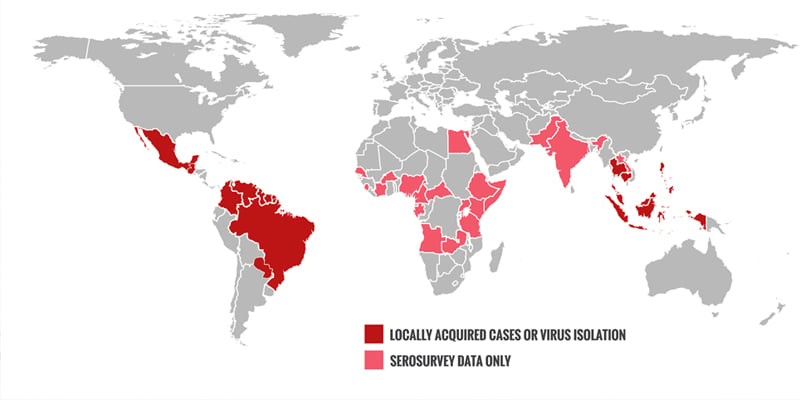
By
Rob Boyle
October 10, 2024
Updated
October 10, 2024

What is Zika and how do I prevent it?
Zika virus is spread through the bites of mosquitoes carrying the virus. Those infected contract Zika fever, which is similar to a very mild form of dengue fever.
How can you become infected by Zika?
Zika virus is primarily spread through the bites of infected mosquitoes. Mosquitoes can become infected when they bite infected persons and can then spread the Zika virus to other persons they subsequently bite. Zika virus has the potential to spread anywhere. Aedes species mosquitoes are the principal carrier of the Zika virus.
What happens if you are bitten by a mosquito carrying Zika?
During the first week of infection, Zika virus can be detected in the blood. In some instances, having direct contact with infectious blood or other bodily fluids (such as semen through sexual transmission) of an infected person may result in transmission of the virus.
Zika virus can be spread from a pregnant woman to her fetus and has been linked to serious birth defect of the brain called microcephaly in babies of mothers who had Zika virus while pregnant.
The infection, known as Zika fever or Zika virus disease, has no or only mild symptoms, similar to a very mild form of dengue fever. Symptoms generally last less than seven days and may include fever, red eyes, joint pain, headache, and rash.
Where is the Zika virus, and how can I prevent infection?
According to the Centres for Disease Control and Prevention (CDC), Zika is prevalent in countries across Africa, Asia, the Caribbean, Central America, South America, and some parts of the Pacific Islands and North America.
In areas affected by Zika virus transmission, it is important to protect yourself and others from possible exposure to the virus by always taking steps to prevent mosquito bites.
There is no vaccine to prevent Zika and there is no specific treatment for individuals who become infected.

How can I prevent mosquito bites?
- Use insect repellents.
- Wear clothing that covers hands, arms, legs, and other exposed skin. Wear hats with mosquito netting to protect the face and neck. Wear socks that cover the ankles and lower legs.
- In warm weather, wear lightweight, loose-fitting clothing. This protects workers against the sun's harmful rays and provides a barrier against mosquitoes.
- Drink plenty of water, take rest breaks in shaded areas, and watch for signs and symptoms of heat illness.
- Get rid of any standing water (e.g. tires, buckets, cans, bottles, barrles) whenever possible to reduce or eliminate mosquito breeding areas. Even a small pool of water collected can serve as a source of water for mosquitoes to lay their eggs.
- Talk to your supervisor(s) about any outdoor work assignment(s) if you or your partner are pregnant or may become pregnant
- Talk to your supervisor(s) about any outdoor work assignment(s) if you or your partner are pregnant or may become pregnant. Such workers should familiarise themselves with information on Zika virus and pregnancy through the Centres for Disease Control and Prevention (CDC).
Guide to using insect repellents
- Always follow label precautions when using insect repellent. Read and follow the directions on all insect repellents before use to avoid reaction to DEET or other ingredients in insect repellents.
- Choose a repellent that provides protection for the amount of time that you will be outdoors. In general, the more active ingredient (higher concentration) a repellent contains, the longer it will protect against mosquito bites.
- Spray inspect repellent (permethrin) on the outside of clothing, if directed on the label, as it is possible for mosquitoes to bite through thin clothing.
- Do NOT spray insect repellent on skin that is under clothing.
- Do NOT apply insect repellent to skin that is already irritated or has cuts/lacerations.
- Do NOT spray aerosol or pump products in enclosed areas.
- Do NOT spray aerosol or pump products directly on the face. First spray it on hands and then carefully spread it on the face. (Do not allow insect repellent to contact the eyes or mouth.)
- Always use soap and water to wash hands and skin that has been treated with insect repellent after returning indoors. Be especially mindful before eating. Re-apply repellent when returning outdoors or after eating.
Using sunscreen and insect repellent:
Outdoor workers may need to use sunscreen in conjunction with insect repellent.
Repellents that are applied according to label instructions may be used with sunscreen with no reduction in repellent activity.
However, limited data show a one-third decrease in the sun protection factor (SPF) of sunscreens when DEET-containing insect repellents are used after a sunscreen is applied.
Where can I learn more about Zika virus?
The Occupational Safety and Health Administration (OSHA) and the National Institute for Occupational Safety and Health (NIOSH) are monitoring the Zika virus outbreak spreading through Central and South America, Mexico, and parts of the Caribbean, including U.S. territories.
For the most up-to-date information, check the Centers for Disease Control and Prevention (CDC) Zika website frequently. Some U.S. states have mosquitoes that can become infected with and spread Zika virus, and travel-associated Zika virus infections in U.S. states may result in local spread of the virus.

